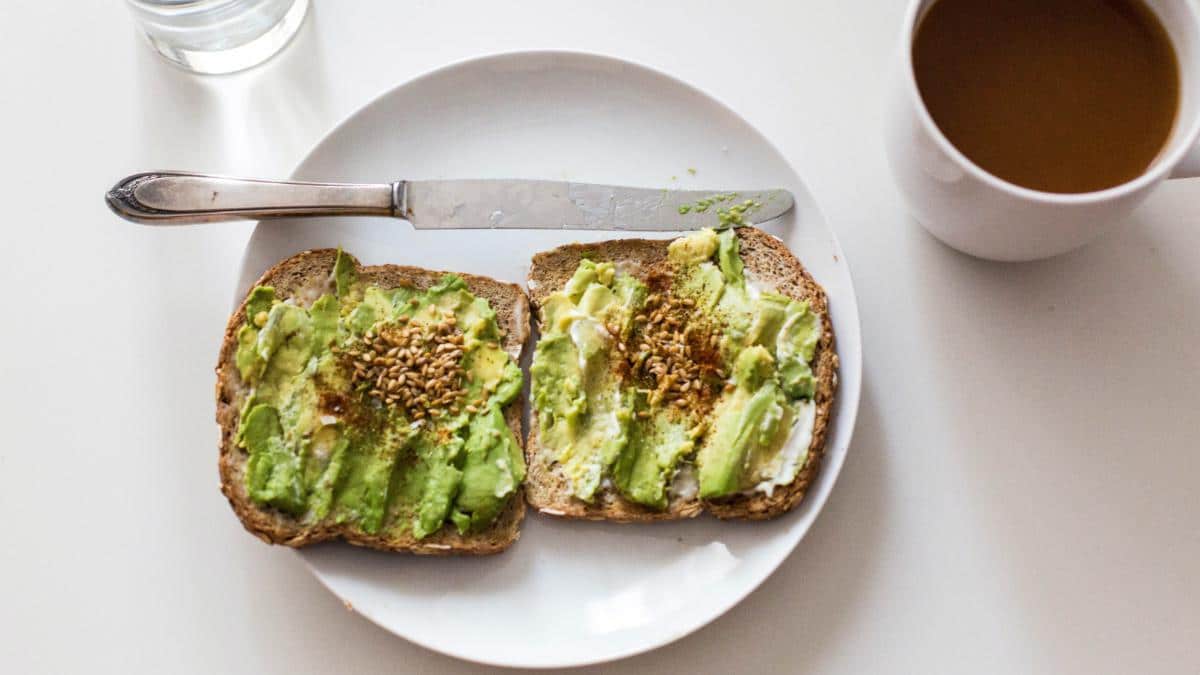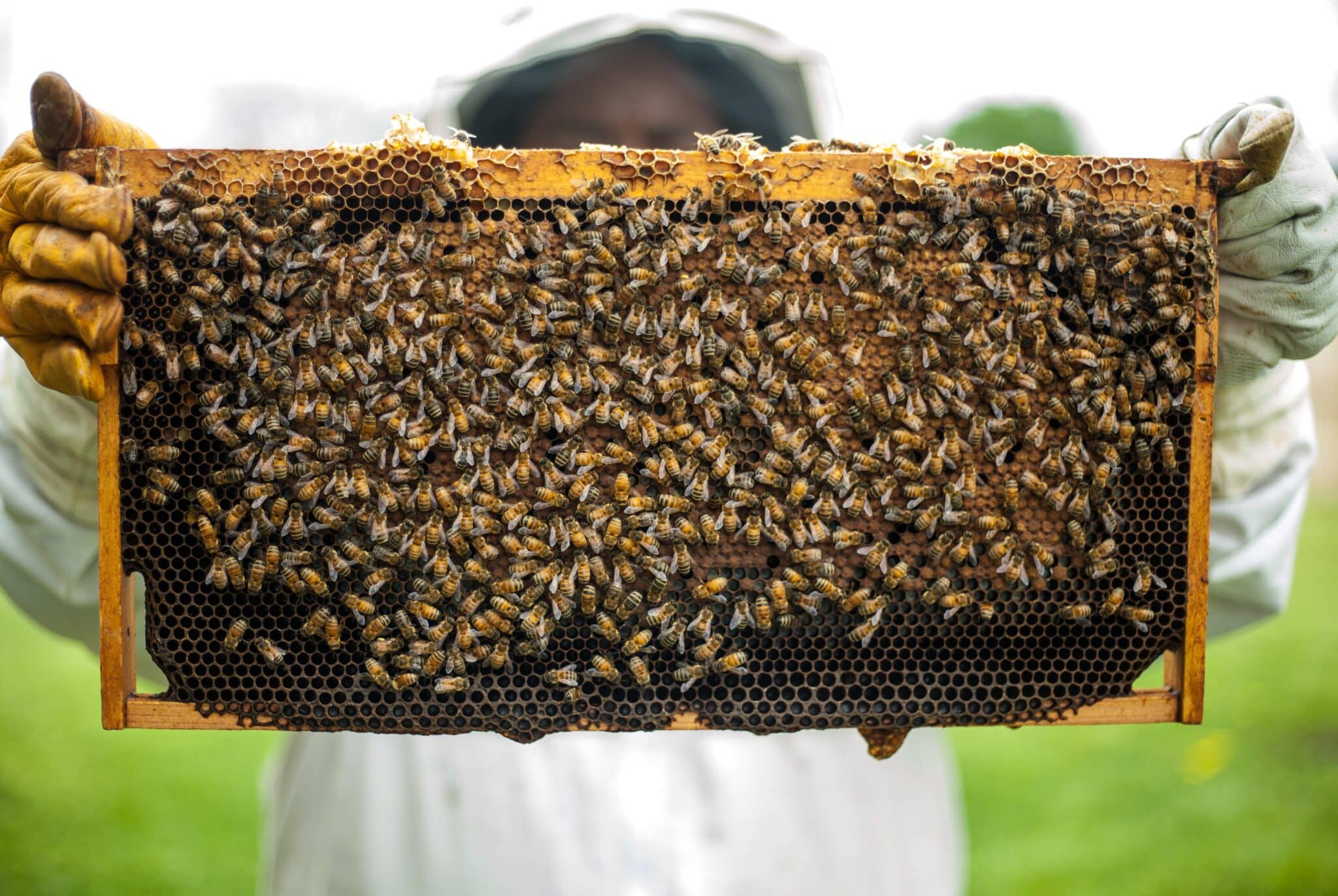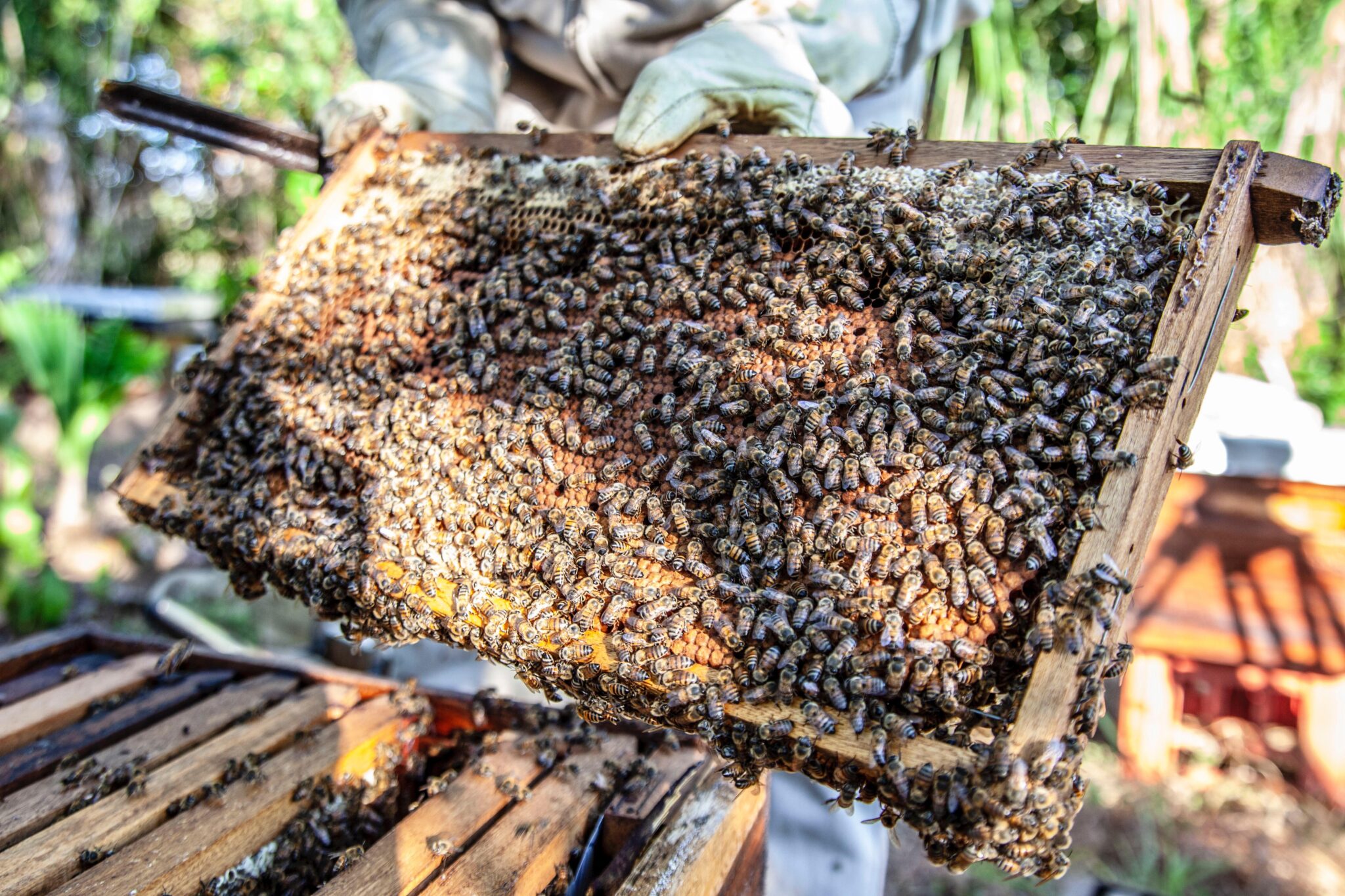
Is Your Avocado Toast and Almond Milk Harming Bees? Maybe

Producing avocado and almond crops is having a detrimental effect on bees. Molly Aaker / Getty Images
At first glance, you wouldn’t think avocados and almonds could harm bees; but a closer look at how these popular crops are produced reveals their potentially detrimental effect on pollinators.
Turns out, bee labor is required to produce most avocados and almonds in the U.S. Honeybees pollinate most fruits and vegetables in the country, The Washington Post reported. With native bee populations in sharp decline, there aren’t enough of them to complete the job naturally or efficiently, The Post added.
Enter migratory beekeeping. Farmers truck beehives full of European honeybees across the country and into their fields so that the insects can pollinate crops during important fertile periods, The Post reported. Without this practice, farmers would lose about one-third of their crops, including broccoli, blueberries, cherries, apples, melons and lettuce, according to The Post.
The practice is so widespread that Tracy Reiman, a representative for PETA, said, “Average shoppers can’t avoid produce that involves migratory beekeeping, any more than they can avoid driving on asphalt,” Vegan Life reported.
In 2013, Scientific American estimated that California’s booming almond industry used 31 to 80 billion migrant honeybees a year in order to achieve maximum pollination during almond trees’ two-week bloom. California produces up to 80 percent of all the world’s almonds, Scientific American noted, and could not achieve such scale without migratory beekeeping.

Migratory beekeeping involves trucking millions of bees across the U.S. to pollinate different crops, including avocados and almonds. Timothy Paule II / Pexels / CC0
According to From the Grapevine, American avocados also fully depend on bees’ pollination to produce fruit, so farmers have turned to migratory beekeeping as well to fill the void left by wild populations.
U.S. farmers have become reliant upon the practice, but migratory beekeeping has been called exploitative and harmful to bees. CNN reported that commercial beekeeping may injure or kill bees and that transporting them to pollinate crops appears to negatively affect their health and lifespan. Because the honeybees are forced to gather pollen and nectar from a single, monoculture crop — the one they’ve been brought in to pollinate — they are deprived of their normal diet, which is more diverse and nourishing as it’s comprised of a variety of pollens and nectars, Scientific American reported.
Scientific American added how getting shuttled from crop to crop and field to field across the country boomerangs the bees between feast and famine, especially once the blooms they were brought in to fertilize end.
Plus, the artificial mass influx of bees guarantees spreading viruses, mites and fungi between the insects as they collide in midair and crawl over each other in their hives, Scientific American reported. According to CNN, some researchers argue that this explains why so many bees die each winter, and even why entire hives suddenly die off in a phenomenon called colony collapse disorder.
Adding pesticides to the picture, bees don’t stand a chance. Many countries still use neonicotinoid pesticides (neonics), which are believed to kill bees. In Jan. 2021, the U.K. faced backlash after approving the emergency use of the toxin on sugar beets, despite pledging not to increase its usage in the wake of Brexit. Although restricted, this family of pesticides is still the most widely used in the U.S., and scientists warn that neonics’ continued prevalence could be catastrophic for food supplies, honeybee populations and mass die-offs of native species. Neonics are a primary cause behind the massive honeybee and native bee losses each year, researchers and environmentalists argue.
In Columbia, mass bee deaths are being blamed directly on avocado farms, Phys.org reported. Avocado exports from Columbia skyrocketed from 1.7 tons in 2014 to 44.5 tons in 2019, and in 2021, Colombia became Europe’s largest avocado supplier, Phys.org added. This boom has resulted in the increased use of neonic insecticide fipronil. Banned in Europe and restricted in the U.S. and China, fipronil is still used in Colombia to grow avocados and citrus for export. This has been bad for neighboring bees, which become contaminated as they buzz through pesticide-treated plantations looking for food.
“They bring this poison to the hive and kill everyone else,” Abdon Salazar, a Columbian beekeeper, lamented to Phys.org after losing 800 hives and 80 million bees in the last two years.

Avocado and almond crops depend on bees for proper pollination. FRANK MERIÑO / Pexels / CC0
Salazar and other Columbian beekeepers described “scooping up piles of dead bees” year after year since the avocado and citrus booms began, according to Phys.org. Many have opted to salvage what partial colonies survive and move away from agricultural areas.
The future of pollinators and the crops they help create is uncertain. According to the United Nations, nearly half of insect pollinators, particularly bees and butterflies, risk global extinction, Phys.org reported. Their decline already has cascading consequences for the economy and beyond. Roughly 1.4 billion jobs and three-quarters of all crops around the world depend on bees and other pollinators for free fertilization services worth billions of dollars, Phys.org noted. Losing wild and native bees could trigger food security issues.
Salazar, the beekeeper, warned Phys.org, “The bee is a bioindicator. If bees are dying, what other insects beneficial to the environment… are dying?”
- Pesticides to Blame for Massive Bee Deaths in Minnesota - EcoWatch
- Trump EPA OKs 'Emergency' Use of Bee-Killing Pesticide on 13.9 ...
- UK Allows Emergency Use of Bee-Killing Pesticide - EcoWatch
- 9 Ways to Eat for Healthier Planet
- So You Want to Be a Beekeeper ... or Just Be There for the Bees
- Deadly Pesticide Still Legal in U.S. Can Harm Bee Populations for Generations, Study Finds - EcoWatch

 233k
233k  41k
41k  Subscribe
Subscribe 